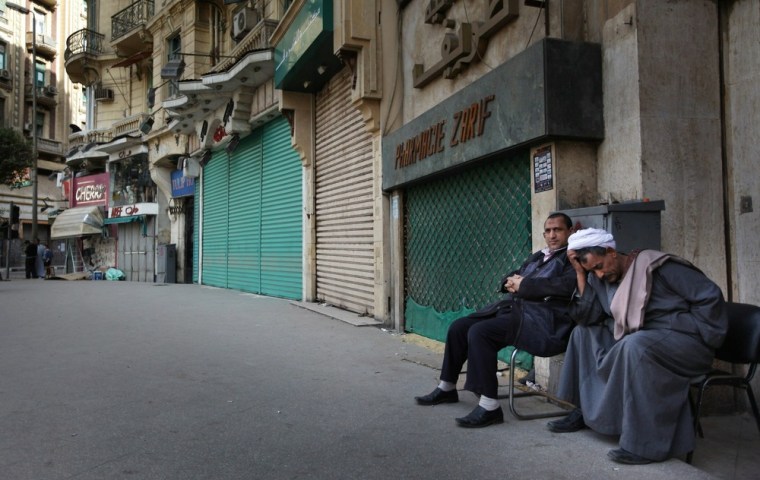An army tank stands guard at the port of Alexandria to make sure no one gets in. The bigger problem is that next to nothing is going out.
For four days now, containers arriving on ships have been stacking up at Egypt’s largest port, shipping company employees and truck drivers here said. With distribution networks barely functioning and the Internet down since Thursday night, much of business in Egypt has nearly ground to a halt.
While protests remain at the center of attention, as jets fly over Liberation Square and escaped prisoners instill fear in the public, the political crisis could turn into a humanitarian one if the current economic paralysis continues.
“A big part of the production system is government-run, and this is frozen, including many of the bakeries making the subsidized bread,” said Hoda Youssef, an economist at the Arab Forum for Alternatives, an independent think tank, and a lecturer at Cairo University. “Here in the short term — today, tomorrow, the coming few days — we might have a serious problem with shortages of food, water and fuel,” Ms. Youssef said.
Egypt was not a country with a wide margin between normalcy and crisis to begin with; it has long been susceptible to price pressures and rioting. And on Sunday there was anecdotal evidence that food prices were already rising.
At one Alexandria market in the western neighborhood of Agamy, the price of onions on Sunday had risen to about 60 cents for a kilogram, or about 2 pounds’ worth, from 25 cents. Tomatoes were up to about 85 cents a kilogram, from a quarter, and the price of a kilogram of beans had risen fivefold to about $1.70 from 35 cents.
Khaled M. Hanafy, an economic adviser to the Federation of Chambers of Commerce in Egypt, the umbrella group representing all the chambers in the country (or some four million businesses), said that while they had no figure for the economy’s losses, the cost of the disruptions had reached the billions of dollars.
“The effect was immediately felt by businesses because so many transactions are completed by the Internet, and particularly the sectors that deal with the outside world,” Mr. Hanafy said. Asked if the chamber’s leadership had raised concerns with the government, he said: “Nowadays, there is no government in office. You don’t have anyone to talk to.”
At the office of the Egyptian Navigation Company, a shipping business in a large, curving building across from the port, employees said the goods lifted off the ships with cranes were not leaving the premises.
“For four days, the goods have remained in there for security reasons,” said Islam Wagih, an assistant to the manager, adding that he had no idea when it would end. “It is not in our hands,” he said.
He was carrying bags of vegetables to take home at midday. “We are trying to provide for our families,” Mr. Wagih said. The security situation was also a worry with Mr. Wagih, who had not slept, he said, because he was helping to guard his neighborhood against looters until 5 a.m.
Ms. Youssef said the flights taking tourists out of the country were carrying off badly needed tourist money with them as well. “Egypt is highly dependent on tourism,” she said. Foreign direct investment would probably decline too, she said, as Egypt’s reputation for stability degenerated further.
“We did not get any new gas for the last two days,” said Mustafa Ahmad Hamadi, the owner of an Alexandria Mobil station, adding that he usually received about 2,600 gallons a day and now has only about 1,300 gallons left. He said that he had owned the station for 12 years, but has “never seen a situation like this before.”
“When I called the company, they told me there is no more distribution at this point and they don’t know when they can deliver again,” he said, as cars lined up for his remaining fuel and arguments broke out among customers despite employees’ efforts to keep them in line.
A taxi driver with two women waiting in the back seat said he had been to 12 gas stations since Saturday, and this was the only one with gas. “I am really worried,” said Muhammad Youssri Said, 29. “This car is the income for me and my family. No taxi, no money, no food.”
Adil Gabir, 43, a truck driver, had just left the port with cargo. “We are the first trucks that were allowed out of the port for the last two days,” he said. “Everything was stopped, and there are still huge problems.”
Many companies were still functioning, if below capacity. The Amreya Petroleum Refining Company could keep working because it has a pipeline connection to the port. It was operating with two shifts instead of the usual three, but employees felt the impact of the strife sweeping Egypt in the most personal and wrenching way.
While talking to reporters on Sunday, Salah Medin, 55, who works at the refinery, received a phone call telling him that its manager had been killed in the protesting.
“This is the price that we pay for freedom,” Mr. Medin said.
This story, "Political Crisis Starts to Be Felt Economically," originally appeared in The New York Times.
